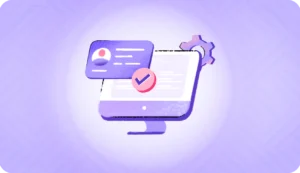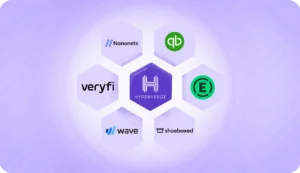Is your business having difficulty managing seamless customer onboarding and effective fraud prevention? Are regulatory compliance challenges impacting your business?
KYC processes and regulatory compliance are closely intertwined in the business domain, particularly in finance, gambling, and other similar sectors. The solution lies in adopting advanced, automated KYC systems for enhanced fraud prevention measures.
Recently, two major Las Vegas casino resorts, MGM Grand and The Cosmopolitan, were fined $4.75 million collectively for violating AML regulations.
In such cases, finding a solution that addresses customer onboarding, fraud prevention, and regulatory compliance is essential.
Enter KYC automation—this technology enables businesses to identify and mitigate risks efficiently and also ensures compliance with regulatory requirements while enhancing security measures.
This blog covers everything you need to know about KYC automation. For now, let’s start with what KYC automation is.
What is KYC automation?
KYC Automation refers to the use of modern technology such as Artificial Intelligence (AI), Machine Learning (ML), or Optical Character Recognition (OCR) to streamline and enhance the KYC process. This is a crucial business risk management strategy, especially in the financial industry.
Automated KYC verification automatically collects, verifies, and stores customer IDs without human intervention.
Businesses can stay ahead of the competitive market by automating various processes, such as identity verification, risk assessment, and ongoing monitoring. Doing so can significantly reduce the time and resources required for compliance, minimize human error, and enhance the overall customer experience.
Want to streamline customer onboarding?
Book a free demo on how HyperVerge’s automated eKYC solution can verify users within seconds and minimize fraud. Book a free demoThat’s KYC automation in a gist. Now, let’s see how it differs from manual KYC.
Difference between manual KYC and automated KYC
Here are a few ways where manual and automated KYC verification differs from each other.
| Aspects | Manual KYC | Automated KYC |
| Efficiency | The process can be time-consuming | The process can be time-saving |
| Decision-making | Manual KYC requires intuitive and spontaneous decision-making during the verification process | Automated KYC deploys systematic decision-making during the verification process |
| Type of process | Manual KYC is a conscious process that involves human effort | Automated KYC uses advanced algorithms for document capture and verification |
| Resource allocation | Businesses pay for it by hiring staff | Businesses pay for it by deploying software |
| Ways for improvement | Manual KYC improves mainly by having the right workforce and timescale | Automated KYC improves mainly by being scalable and regular update |
With the difference between manual and automated KYC clear, let’s check out what strategies KYC automation uses.
Top 4 KYC automation strategies to implement in your business
Here are 4 key strategies for implementing KYC automation effectively, along with technologies to consider:
1. End-to-end KYC journey automation
Effective KYC automation takes care of everything from start to finish. End-to-end KYC journey automation uses AI to enable businesses to build, tweak, and manage projects, such as KYC automation, without requiring coding. Many solutions, such as HyperVerge, offer the implementation of no-code KYC automation.
2. Use OCR and NLP for accurate assessment of human language
Reading and understanding written data is a basic human skill. However, Optical Character Recignition (OCR) helps improve the accuracy of document processing as it eliminates the chance of human error. Moreover, OCR also increases document processing efficiency by processing structured and unstructured documents within milliseconds, something that’s not possible for humans.
3. Utilize AI and ML for efficiency and accuracy
Time efficiency is one of the key benefits of automated KYC verification (more on that below). Artificial intelligence (AI) and Machine Learning (ML) algorithms enable the automated KYC system to perform faster and on more customers concurrently. AI and data analytics work together to improve a system’s efficiency.
4. Incorporate data analytics for useful insights
Data analytics involves analyzing raw data to discover patterns and trends that provide valuable insights. For example, if there’s a certain process a system has to do in every verification, the AI module can deduce and remember it for future operations. That way, the AI-module can help the system get all the necessary prerequisites beforehand to complete the task optimally.
KYC has been a manual process since its inception, and opting for manual KYC is still a viable option. However, businesses should know about it and prepare for some drawbacks.
9 Key problems with manual KYC in business operations
Manual KYC processes are associated with significant problems, which impact work efficiency, fraud management, and business development. Here are the following 9 key problems associated with manual KYC processes:
1. Manual KYC can be a time-consuming process
Manual KYC requires human workers to check and verify identities, perform due diligence, and enter data manually. It means checking every detail in every document, one at a time.
2. Expanding manual KYC can be labor-intensive
Businesses have to speed up the KYC process to accommodate more customers concurrently. For that, companies will have to hire more workers, requiring significant resources. Hence, operating KYC manually will increase operational costs on a larger scale.
3. Manual KYC is prone to human error
Businesses must always set a margin of human error. Whenever people do the majority of the work, mistakes can happen. These can range from identity mix-ups between two customers to typos during manual data entry or accepting a fake/false ID as a real one.
4. Businesses and customers have to deal with inconsistent standards
When different employees handle the KYC process, they might have operational differences. For example, there might be a disparity in the level of attention to detail they apply to customers. Hence, customers from various regions or applying for KYC at different times may have different experiences on the same platform.
5. Gets harder to expand the scale of manual KYC
Using manual KYC processes can make sense in smaller business firms. But, as customer bases expand, so does the number of simultaneous KYC checks. In such cases, manual KYC checks can create a bottleneck in customer onboarding and due diligence.
6. Manual KYC may come with data security risks
KYC includes checking and storing sensitive customer information. If employees are not careful enough or make a mistake, someone can gain illegal access to the sensitive data of multiple customers.
7. Customers may go through a worsening onboarding experience
Inconsistency, human errors, or even long processing times can create customer friction. If the first step—the customer onboarding process of a business turns out to be a hindering experience, it can negatively impact the brand’s overall reputation.
8. External need for an audit trail in manual KYC
Compliance with regulations requires a comprehensive audit trail. Businesses that manually operate KYC must explicitly spend time and other resources to create and maintain an audit trail to ensure compliance.
9. Businesses with manual KYC have to tackle other regulatory requirements
Even with the updated audit trail, it may be difficult for manual KYC processes to keep up with ever-changing KYC regulatory compliance guidelines.
Now that you know what challenges come with manual KYC, let’s check out the advantages of automated KYC verification.
8 Major benefits of KYC automation for streamlined business process
Automated KYC verification can help financial institutions and businesses in the following ways:
1. Increases efficiency
As fast as human employees can be, they are no match against a computer’s operational efficiency. These days, some solution providers, such as HyperVerge’s KYC solution, can perform accurate authentications in just 1 second.
2. Enhances accuracy by eliminating human error
Automated systems result in reduced manual errors, such as typing errors, misinterpretation, or identity mix-ups. Powerful AI tools such as HyperVerge’s automated KYC solutions can work free of manual errors during verification with over 95% data accuracy.
3. Enables seamless scalability for growth
Unlike manual KYC, businesses can scale up their customer onboarding process through automated systems to unprecedented heights. Moreover, as the scale of KYC goes higher, other benefits such as time- and cost-efficiency also become much stronger.
4. Fortifies security measures for data protection
Businesses can incorporate safety measures such as data encryption, authorization to access, and real-time monitoring into their KYC automation system. These tools enable businesses to detect and prevent unauthorized access to customer information or large-scale data breaches instantaneously.
5. Makes better cost savings by optimizing resource allocation
Manual KYC processes require assigning more employees for the task, which can take up a lot of resources. With automated KYC processes, you can increase or decrease the number of concurrent KYC processes without changing much in the overall workflow and resource allocation.
6. Improves customer experience by streamlining KYC processes
A KYC process requires the customer’s active participation. If the KYC takes longer to complete, the customer also loses time. automated KYC processes reduce the time commitment from the customer, improving the customer experience.
7. Allows easier regulatory adherence with updated compliance checks
Businesses can also easily integrate a comprehensive log of tasks into automated processes. This helps with keeping an up-to-date audit trail. Moreover, the records will also come in handy for ensuring regulatory requirements.
8. Enables enhanced data analysis for better decision-making
Businesses and financial institutions can use data analysis for benefits other than efficiency and productivity. One is better decision-making by looking at past and current patterns in customer data. Another is figuring out common fraud or security breaches to better prepare for them. Overall, data analysis through KYC automation can help businesses gain a competitive advantage.
These were the key benefits of KYC automation. Now, let’s see 5 ways you can enhance your business with the help of KYC automation.
Top 5 use cases for KYC automation
KYC automation proved to be a versatile tool, enhancing businesses in numerous ways. Here are 5 key examples.
1. Enhances customer onboarding and helps launch new onboarding journeys faster
Customer onboarding is the process a customer goes through to start using a service, and KYC is a primary part of it. KYC process automation provides an easier and faster customer onboarding experience, increasing customer satisfaction. Solutions such as HyperVerge ONE can help your business launch new onboarding journeys quickly. This becomes even more effective for huge firms onboarding customers on a larger scale.
2. Enables digital wallet services
KYC is mandatory if a company wants to start offering digital payment services. An effective and streamlined automated KYC in their arsenal will help companies offer financial transactions through their digital wallet service. Companies like Apple, Google, Amazon, and Jio, which are not strictly in the FinTech sector, can provide such services through a robust KYC platform. Fulfilling such requirements will make it easy for businesses to offer services like digital wallets.
4. Allows accurate AML verification
Businesses facilitating online transactions must be prepared against threats like money laundering or terrorism-funding. Companies operating in the financial sector must also comply with anti-money laundering (AML) regulations. These businesses can use automated KYC’s enhanced verification process and real-time monitoring capabilities to their advantage. In some cases, effective KYC processes may even negate the need for an external AML solution.
5. Enables access to robust analysts
An analytics dashboard with all the necessary information can be an ace up your sleeve. Analysis of user experience can provide useful insights such as user behavior and engagement levels. With that information, you can nail the way your business creates a first impression in front of customers. Having a robust analytics dashboard can boost your business as well as conversion rates.
KYC automation solution providers
Implementing KYC process automation into an existing workflow can be daunting. Fortunately, several solution providers can help you seamlessly integrate KYC automation into your business.
Here are 6 of the best KYC automation solution providers in the market.
| Platforms | G2 Ratings (out of 5 stars) | Key features |
| 4.7 Stars | • ID verification • KYC • AI-based fraud prevention • OCR • Anti-money laundering (AML) screening • Document verification • Deep fake detection • KYB • Customer onboarding | |
| 4.6 Stars | • ID verification • KYC • AML | |
| 4.1 Stars | • ID verification • AML screening | |
| 4.4 Stars | • Document verification • Biometric verification • ID verification | |
| 4.5 Stars | • Risk assessment • ID verification | |
| 4.4 Stars | • ID verification • Business verification |
As you can see in the table, multiple solution providers exist for hassle-free KYC automation integration in your business. However, HyperVerge stands out with more custom APIs to offer, and customers love it, as the high G2 review score suggests.
Verify users within seconds with HyperVerge KYC automation
KYC automation is a must-have tool to enhance your business in multiple ways. HyperVerge ONE is an easy-to-use, powerful AI automation solution for such needs. HyperVerge ONE offers custom APIs to infuse KYC automation with your current business structure with end-to-end KYC journey automation, an analytics dashboard, and 0.2-second authentication speed.
Our AI-powered KYC automation and digital verification solution authenticates faces with essential features such as:
- Liveness checks
- Deep fake detection.
- Face deduplication
Top companies like LinkedIn, SBI, Zomato, CRED, and Tata Capital use HyperVerge’s solutions. The platform has earned 4.7 stars out of 5 in G2 ratings and reviews.
HyperVerge’s best-in-class AI technology is exceptionally capable, with over 750 Million IDs verified at a 95% auto-approval rate.
Grow your business using automated KYC now
HyperVerge can help you meet KYC requirements and elevate customer onboarding to the next level. Sign up nowFrequently asked questions about KYC automation
1. What types of documents does customer verification usually require?
The KYC verification process requires government-issued IDs such as passports, driver’s licenses, or national identity cards. Additionally, KYC documents can include address proofs like utility bills or bank statements.
2. How long does it take to implement KYC automation in a business?
The implementation timeline can vary based on specific requirements. In some cases, businesses may have to spend days fully integrating a third-party API. On the other hand, solution providers like HyperVerge offer customizable APIs that can go live in just four hours.
3. Is KYC automation suitable for all types of businesses?
KYC automation solutions enhance existing KYC processes. Hence, any business that uses manual KYC can reap the benefits of KYC automation. Moreover, new businesses or businesses expanding in the finance sector that may require KYC can also start directly with automated KYC for optimal profits and protection against financial crimes from day one.
4. Can KYC automation handle high volumes of applications?
Yes, KYC automation can handle large volumes of applications, provided it uses AI and ML capabilities to the fullest. Processing large volumes of data, like transaction customer information, will only help the automated KYC system’s AI module analyze the data and become even more proficient.
5. What are the 3 components of KYC user verification processes?
The 3 main components of KYC verification processes are Customer Identification Program (CIP), Customer Due Diligence (CDD), and Ongoing Monitoring.





